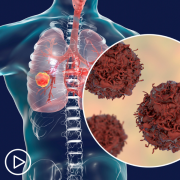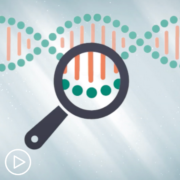Which Tests Do You Need Before Choosing a Lung Cancer Treatment?
Which Tests Do You Need Before Choosing a Lung Cancer Treatment? from Patient Empowerment Network on Vimeo.
Why is it important to ask about biomarker testing for your lung cancer? Find out how test results could reveal more about your lung cancer and may help determine the most effective treatment approach for your individual disease.
See More From INSIST! Lung Cancer
Related Resources:

|

|

What Are the Advantages of Newer Lung Cancer Treatment Approaches? |
Transcript:
Why should you ask your doctor about biomarker testing?
Biomarker testing, sometimes referred to as molecular testing or genetic testing, identifies specific gene mutations, proteins, chromosomal abnormalities, and/or other molecular changes that are unique to YOU and YOUR lung cancer.
The analysis is performed by testing the tumor tissue or by testing tumor DNA extracted from blood to identify unique characteristics of the cancer itself.
So why do the test results matter?
The test results may predict how your lung cancer will behave and could indicate that one type of treatment may be more effective than another.
In some cases, biomarkers can indicate that a newer approach, such as targeted therapy or immunotherapy, may work better for you.
Common mutations associated with lung cancer include the EGFR, ALK, ROS1, BRAF, TP53 and KRAS genes, among others. In some cases, there are inhibitor therapies that target specific mutations. For example, if the EGFR mutation is detected, it may mean that an EGFR inhibitor, a type of targeted therapy, may work well for your type of lung cancer.
Another common biomarker associated with lung cancer is PD-L1. PD-L1 is a receptor expressed on the surface of tumor cells. The presence of PD-L1 indicates that a lung cancer patient may respond well to immunotherapy.
The results could also show that your cancer has a mutation or marker that may prevent a certain therapy from being effective, sparing you from getting a treatment that won’t work well for you.
Identification of biomarkers may also help you to find a clinical trial that may be appropriate for your particular cancer.
How can you insist on the best lung cancer care?
- First, bring a friend or a loved one to your appointments to help you process and recall information.
- Before you begin treatment, ensure you have had biomarker testing. Talk with your doctor about the results and how they may impact your care and treatment plan.
- Finally, always speak up and ask questions. Remember, you have a voice in YOUR lung cancer care.
To learn more about lung cancer and to access tools for self-advocacy, visit powerfulpatients.org/lungcancer.










